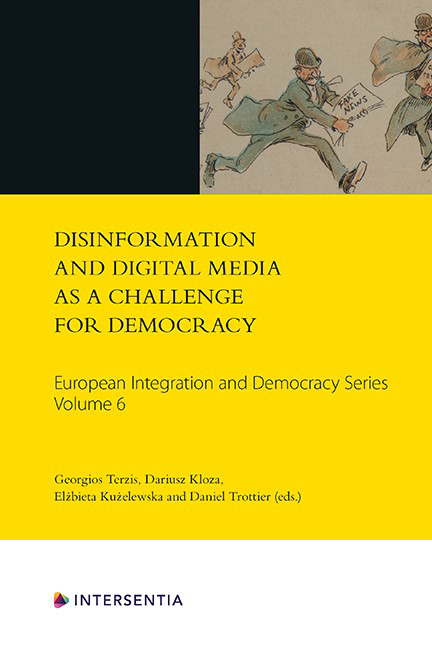Book contents
- Frontmatter
- Foreword: Fooling All of the People All of the Time: Democracy in the Age of Fake News
- Introduction: ‘They All Hear “Ping” at the Same Time’
- Contents
- List of Abbreviations
- List of Contributors
- PART I THEORETICAL APPROACHES TO AND THE CONCEPTUALISATION OF DISINFORMATION
- PART II EXPERIENCE OF DEALING WITH DISINFORMATION
- PART III SOLUTIONS TO DEAL WITH DISINFORMATION AND THEIR CRITIQUE
8 - True Story! Challenges to Democracy not Covered by the Media: Lessons from the (Non-)Coverage of the Greek Financial Crisis
Published online by Cambridge University Press: 26 May 2021
- Frontmatter
- Foreword: Fooling All of the People All of the Time: Democracy in the Age of Fake News
- Introduction: ‘They All Hear “Ping” at the Same Time’
- Contents
- List of Abbreviations
- List of Contributors
- PART I THEORETICAL APPROACHES TO AND THE CONCEPTUALISATION OF DISINFORMATION
- PART II EXPERIENCE OF DEALING WITH DISINFORMATION
- PART III SOLUTIONS TO DEAL WITH DISINFORMATION AND THEIR CRITIQUE
Summary
INTRODUCTION
It is almost a truism to state that what is not there is sometimes more important than what it is. Before the 2008 financial crisis, between 2002 and July 2007, approximately 300 stories with a ‘banking crisis’ tag were written in the UK. Most were found in the back of newspapers and were discussing the Japanese economy. Once the story of the financial crisis first broke in the US, over 3,000 stories with the same tag could be found –this time on the front pages as major stories– between August 2007 and mid-2009. The numbers alone explain that few people were aware of the financial crisis ‘truth’ that hit them before it was a hot news issue.
Once the media coverage started, three stages of narratives emerged: initial surprise at the situation; a blame game between countries, banks, politicians and individuals; and dramatic headlines depicting the demise (or, on occasion, the strengthening) of the eurozone. These stages produced two different types of media coverage – one from the ‘high-end quality’ journalism with reports that included some serious analysis and an attempt to create a consistent picture and the other the tabloid-style journalism in which the focus was on'scumbag millionaires ‘and ‘fat cats working at the banks’ , and discussions concerning which countries were to blame for financial failings (Greece, Italy, Portugal, Spain and Ireland) and which were to blame during the efforts of creating reform (for the most part, Germany).
Those failings of the press to act as an early warning system and subsequently to cover some of the fundamental truths behind the crisis were mainly attributed to the fact that most reporters around the world were not sufficiently trained to report a story of this magnitude, including financial reporters who are experienced on reporting companies and microeconomics instead of macroeconomics and international debt cases.
This effect is even more apparent with international finance news, which is more technical in nature and thus requires a certain degree of background knowledge in order to be able to dive into the data.
- Type
- Chapter
- Information
- Disinformation and Digital Media as a Challenge for Democracy , pp. 151 - 160Publisher: IntersentiaPrint publication year: 2020



